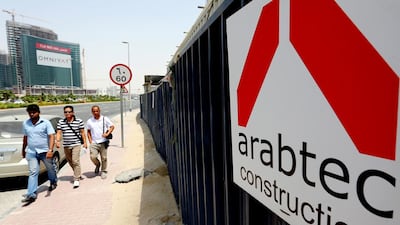The Egyptian stock exchange generated better returns than any other regional bourse in 2014 as the economy entered a new phase of growth spurred by aid from the Arabian Gulf.
Most Middle East stock markets collapsed in December amid a plunge in crude oil, but Egypt is a net oil importer and is set to benefit from the lower prices.
The most populous Arab nation is also on the cusp of an economic comeback. Following years of dismal growth amid political chaos in which the country has had two presidents in as many years, it is now on the path to recovery with the IMF forecasting 3.5 per cent GDP growth next year from 2.2 per cent this year.
Since being elected in May, the president, Abdel Fattah El Sisi, has started to take steps to reduce state expenditure by cutting energy subsidies – huge discounts on petroleum products that have weighed down the government’s finances for decades.
All this has cheered investors who helped boost the value of the EGX30 index by 32 per cent this year. That makes it not only the best performer in the Middle East but the fourth-best performer in the world after indexes in China, Venezuela and Pakistan. But elsewhere in the region, volatility erased many of the gains seen earlier in the year as oil dropped by almost half, heading for its biggest decline since 2008.
“2015 will be the actual implementation of economic reforms in Egypt, the actual announcements by companies investing in the country, when we start to see some of the unemployment numbers come down, and then the economic summit that is due to take place in March,” said Sherif Salem, a portfolio manager at Invest AD, an Abu Dhabi-based asset manager, referring to an investment conference during which it is expected foreign investment will be pledged.
“Providing that everything goes well with the economic changes and improvements, I think we should see a positive return in 2015,” he added.
Elsewhere in the region, the big bourses of the Gulf may have started the year with a bang but they pared those gains as the plummeting value of oil took its toll on the price of listed companies across the region.
The QE Index in Qatar led the gainers in the Gulf, rising 18 per cent. Bahrain followed with 14 per cent. The Dubai Financial Market finished 12 per cent higher, while the Abu Dhabi measure rose 5.5 per cent. However, Saudi Arabia, with the biggest market capitalisation in the Gulf, finished 2.4 per cent lower over the year.
Despite the sharp drops in December, many investors have not written off the region’s prospects.
“I think the UAE has the fiscal buffers, they have accumulated reserves, done the right things in the good days to be weathering this decline in oil revenues quite well,” said John Sfakianakis, the Riyadh-based director for the GCC at Ashmore Group, an emerging market asset manager headquartered in London.
Among the UAE’s listed companies on MSCI’s emerging markets index, the construction company Arabtec stood out as the big stock story of 2014. Markets were sent into free fall when fund managers and retail investors were left in the dark over June following the resignation of Arabtec’s chief executive Hasan Ismaik, and Aabar subsequently boosted its stake in the builder.
Despite the controversy that surrounded the lack of disclosure over the sale of the stake, the stock still returned a gain of almost 43 per cent for the year – the best of the nine UAE companies in the index. That is even after the company’s stock rose as high as Dh7.74 before closing the year at Dh2.93.
Insurers, however, did not fare that well as increased competition among them hurt profit margins, with seven insurers dropping heavily in 2014. The declines for insurers were led by Takaful House and Islamic Arab Insurance in Dubai, which fell 52 per cent and 43 per cent, respectively.
mkassem@thenational.ae

